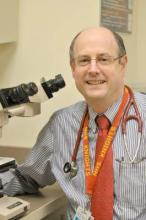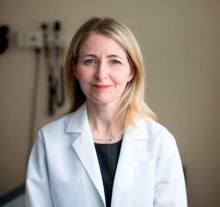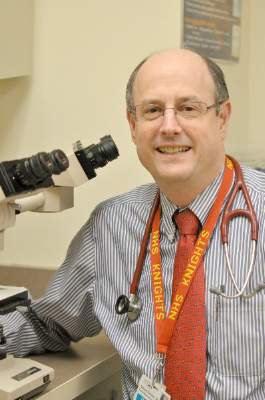User login
If you haven’t dealt with a chikungunya patient yet, you probably will soon.
The mosquito-borne virus, long considered a tropical disease, is on the upswing in the United States, carried back especially by vacationers returning from the Caribbean. It causes an inflammatory arthritis that’s hard to recognize and treat.
“We’ve actually even had some here in Seattle,” said Dr. Gregory Gardner, a rheumatologist at the University of Washington, Seattle.
So a session this year at the annual meeting of the American College of Rheumatology, “Coming to a Joint Near You: Chikungunya” on Sunday, Nov. 8, at 8:30 a.m., is probably one that attendees won’t want to miss, said Dr. Gardner, one of the many planners of this year’s meeting.
The session will cover chikungunya immunopathology, clinical manifestations, and treatment – just about all you need to know to handle a case. The chikungunya session is just one example of the meeting’s timely, on-point clinical information. Another one that’s likely to be popular is “Maintenance Therapy in ANCA-Associated Vasculitis: Evaluation and Treatment of Patients in Remission,” on Monday, Nov. 9, at 7:30 a.m., and “The Great Debate: Long-Term, Low-Dose Corticosteroid Use in the Treatment of Rheumatoid Arthritis” on Sunday at 2:30 p.m. While some worry about the long-term side effects of steroids in rheumatoid arthritis, others think the approach is safe and possibly even disease modifying, Dr. Gardner said.
The clinical sessions will be complimented by a full slate of original science. “We’ve had more abstracts submitted this year than to any other previous meeting,” over 4,000. “There’s great research being presented,” said Dr. Victoria Shanmugam, a Washington, D.C., rheumatologist and also a planner of this year’s meeting.
Getting into the late-breaking abstract session on Tuesday, Nov. 10, at 4:30 p.m. “was incredibly competitive this year,” she said. Just a handful of the 70 submissions made it. Investigators who did will share their latest findings on tocilizumab for giant cell arteritis; baricitinib versus placebo or adalimumab for rheumatoid arthritis; adalimumab with methotrexate for uveitis in juvenile idiopathic arthritis; epratuzumab in moderate to severe systemic lupus; tofacitinib in ankylosing spondylitis; and interleukin-17a inhibition in active ankylosing spondylitis.
There’ll also be a strong show of original research in the plenary sessions at 11 a.m. Sunday, Monday, and Tuesday. Studies in Tuesday’s session, for instance, include investigations into the pharmacogenetics of allopurinol in gout and the role of anakinra in recurrent pericarditis.
Results from the Scleroderma Lung Study II, which pitted oral cyclophosphamide against mycophenolate mofetil for interstitial lung disease in systemic sclerosis, will be revealed Sunday at 4:30 p.m. in the “Systemic Sclerosis, Fibrosing Syndromes, and Raynaud’s – Clinical Aspects and Therapeutics I” session. Until now, there haven’t been strong prospective data to support the use of mycophenolate in scleroderma lung disease. “There will be a lot of interest in this. People have been waiting for these results to come out,” Dr. Shanmugam said.
Planners have done something new this year by bringing fertility and pregnancy research into its own dedicated abstract session, “Reproductive Issues in Rheumatic Disorders: Basic and Clinical Aspects,” on Monday at 4:30 p.m.
It’s recognition of the central role those issues play in rheumatology. Fertility and pregnancy are a “major clinical challenge we face in daily practice. Our diseases often present during pregnancy, and we tend to have diseases that affect young women. Patients have a lot of questions,” Dr. Shanmugam said.
The abstract session will be a mix of basic and clinical research across a range of rheumatic conditions. The hope is to break down the silos in rheumatology to foster collaboration and move the field forward, she said.
That session will be complemented by “Reproductive Issues in Rheumatology” on Wednesday at 11:00 a.m. – focusing on biologics in pregnancy and pregnancy outcomes in rheumatoid arthritis – as well as “Pregnancy and Infertility in Rheumatic Disease” on Monday at 2:30 p.m.
Macrophage activation is getting its share of attention, too, especially in adults, for instance during the “Nuts and Bolts of Macrophage Activation Syndrome” session on Monday at 8:30 a.m.
“Historically, it’s mainly been studied in children. We wanted to focus on bringing this into adult rheumatology. I think this is going to be a very good session,” Dr. Shanmugam said.
If you haven’t dealt with a chikungunya patient yet, you probably will soon.
The mosquito-borne virus, long considered a tropical disease, is on the upswing in the United States, carried back especially by vacationers returning from the Caribbean. It causes an inflammatory arthritis that’s hard to recognize and treat.
“We’ve actually even had some here in Seattle,” said Dr. Gregory Gardner, a rheumatologist at the University of Washington, Seattle.
So a session this year at the annual meeting of the American College of Rheumatology, “Coming to a Joint Near You: Chikungunya” on Sunday, Nov. 8, at 8:30 a.m., is probably one that attendees won’t want to miss, said Dr. Gardner, one of the many planners of this year’s meeting.
The session will cover chikungunya immunopathology, clinical manifestations, and treatment – just about all you need to know to handle a case. The chikungunya session is just one example of the meeting’s timely, on-point clinical information. Another one that’s likely to be popular is “Maintenance Therapy in ANCA-Associated Vasculitis: Evaluation and Treatment of Patients in Remission,” on Monday, Nov. 9, at 7:30 a.m., and “The Great Debate: Long-Term, Low-Dose Corticosteroid Use in the Treatment of Rheumatoid Arthritis” on Sunday at 2:30 p.m. While some worry about the long-term side effects of steroids in rheumatoid arthritis, others think the approach is safe and possibly even disease modifying, Dr. Gardner said.
The clinical sessions will be complimented by a full slate of original science. “We’ve had more abstracts submitted this year than to any other previous meeting,” over 4,000. “There’s great research being presented,” said Dr. Victoria Shanmugam, a Washington, D.C., rheumatologist and also a planner of this year’s meeting.
Getting into the late-breaking abstract session on Tuesday, Nov. 10, at 4:30 p.m. “was incredibly competitive this year,” she said. Just a handful of the 70 submissions made it. Investigators who did will share their latest findings on tocilizumab for giant cell arteritis; baricitinib versus placebo or adalimumab for rheumatoid arthritis; adalimumab with methotrexate for uveitis in juvenile idiopathic arthritis; epratuzumab in moderate to severe systemic lupus; tofacitinib in ankylosing spondylitis; and interleukin-17a inhibition in active ankylosing spondylitis.
There’ll also be a strong show of original research in the plenary sessions at 11 a.m. Sunday, Monday, and Tuesday. Studies in Tuesday’s session, for instance, include investigations into the pharmacogenetics of allopurinol in gout and the role of anakinra in recurrent pericarditis.
Results from the Scleroderma Lung Study II, which pitted oral cyclophosphamide against mycophenolate mofetil for interstitial lung disease in systemic sclerosis, will be revealed Sunday at 4:30 p.m. in the “Systemic Sclerosis, Fibrosing Syndromes, and Raynaud’s – Clinical Aspects and Therapeutics I” session. Until now, there haven’t been strong prospective data to support the use of mycophenolate in scleroderma lung disease. “There will be a lot of interest in this. People have been waiting for these results to come out,” Dr. Shanmugam said.
Planners have done something new this year by bringing fertility and pregnancy research into its own dedicated abstract session, “Reproductive Issues in Rheumatic Disorders: Basic and Clinical Aspects,” on Monday at 4:30 p.m.
It’s recognition of the central role those issues play in rheumatology. Fertility and pregnancy are a “major clinical challenge we face in daily practice. Our diseases often present during pregnancy, and we tend to have diseases that affect young women. Patients have a lot of questions,” Dr. Shanmugam said.
The abstract session will be a mix of basic and clinical research across a range of rheumatic conditions. The hope is to break down the silos in rheumatology to foster collaboration and move the field forward, she said.
That session will be complemented by “Reproductive Issues in Rheumatology” on Wednesday at 11:00 a.m. – focusing on biologics in pregnancy and pregnancy outcomes in rheumatoid arthritis – as well as “Pregnancy and Infertility in Rheumatic Disease” on Monday at 2:30 p.m.
Macrophage activation is getting its share of attention, too, especially in adults, for instance during the “Nuts and Bolts of Macrophage Activation Syndrome” session on Monday at 8:30 a.m.
“Historically, it’s mainly been studied in children. We wanted to focus on bringing this into adult rheumatology. I think this is going to be a very good session,” Dr. Shanmugam said.
If you haven’t dealt with a chikungunya patient yet, you probably will soon.
The mosquito-borne virus, long considered a tropical disease, is on the upswing in the United States, carried back especially by vacationers returning from the Caribbean. It causes an inflammatory arthritis that’s hard to recognize and treat.
“We’ve actually even had some here in Seattle,” said Dr. Gregory Gardner, a rheumatologist at the University of Washington, Seattle.
So a session this year at the annual meeting of the American College of Rheumatology, “Coming to a Joint Near You: Chikungunya” on Sunday, Nov. 8, at 8:30 a.m., is probably one that attendees won’t want to miss, said Dr. Gardner, one of the many planners of this year’s meeting.
The session will cover chikungunya immunopathology, clinical manifestations, and treatment – just about all you need to know to handle a case. The chikungunya session is just one example of the meeting’s timely, on-point clinical information. Another one that’s likely to be popular is “Maintenance Therapy in ANCA-Associated Vasculitis: Evaluation and Treatment of Patients in Remission,” on Monday, Nov. 9, at 7:30 a.m., and “The Great Debate: Long-Term, Low-Dose Corticosteroid Use in the Treatment of Rheumatoid Arthritis” on Sunday at 2:30 p.m. While some worry about the long-term side effects of steroids in rheumatoid arthritis, others think the approach is safe and possibly even disease modifying, Dr. Gardner said.
The clinical sessions will be complimented by a full slate of original science. “We’ve had more abstracts submitted this year than to any other previous meeting,” over 4,000. “There’s great research being presented,” said Dr. Victoria Shanmugam, a Washington, D.C., rheumatologist and also a planner of this year’s meeting.
Getting into the late-breaking abstract session on Tuesday, Nov. 10, at 4:30 p.m. “was incredibly competitive this year,” she said. Just a handful of the 70 submissions made it. Investigators who did will share their latest findings on tocilizumab for giant cell arteritis; baricitinib versus placebo or adalimumab for rheumatoid arthritis; adalimumab with methotrexate for uveitis in juvenile idiopathic arthritis; epratuzumab in moderate to severe systemic lupus; tofacitinib in ankylosing spondylitis; and interleukin-17a inhibition in active ankylosing spondylitis.
There’ll also be a strong show of original research in the plenary sessions at 11 a.m. Sunday, Monday, and Tuesday. Studies in Tuesday’s session, for instance, include investigations into the pharmacogenetics of allopurinol in gout and the role of anakinra in recurrent pericarditis.
Results from the Scleroderma Lung Study II, which pitted oral cyclophosphamide against mycophenolate mofetil for interstitial lung disease in systemic sclerosis, will be revealed Sunday at 4:30 p.m. in the “Systemic Sclerosis, Fibrosing Syndromes, and Raynaud’s – Clinical Aspects and Therapeutics I” session. Until now, there haven’t been strong prospective data to support the use of mycophenolate in scleroderma lung disease. “There will be a lot of interest in this. People have been waiting for these results to come out,” Dr. Shanmugam said.
Planners have done something new this year by bringing fertility and pregnancy research into its own dedicated abstract session, “Reproductive Issues in Rheumatic Disorders: Basic and Clinical Aspects,” on Monday at 4:30 p.m.
It’s recognition of the central role those issues play in rheumatology. Fertility and pregnancy are a “major clinical challenge we face in daily practice. Our diseases often present during pregnancy, and we tend to have diseases that affect young women. Patients have a lot of questions,” Dr. Shanmugam said.
The abstract session will be a mix of basic and clinical research across a range of rheumatic conditions. The hope is to break down the silos in rheumatology to foster collaboration and move the field forward, she said.
That session will be complemented by “Reproductive Issues in Rheumatology” on Wednesday at 11:00 a.m. – focusing on biologics in pregnancy and pregnancy outcomes in rheumatoid arthritis – as well as “Pregnancy and Infertility in Rheumatic Disease” on Monday at 2:30 p.m.
Macrophage activation is getting its share of attention, too, especially in adults, for instance during the “Nuts and Bolts of Macrophage Activation Syndrome” session on Monday at 8:30 a.m.
“Historically, it’s mainly been studied in children. We wanted to focus on bringing this into adult rheumatology. I think this is going to be a very good session,” Dr. Shanmugam said.
FROM THE ACR ANNUAL MEETING


